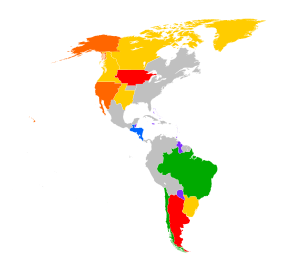Ameroskepticism

Ameroskepticism, also spelled as Ameroscepticism or CAS-skepticism, refers to criticism of and opposition to the Conference of American States. It reflects a wide range of opinions including those who oppose certain or select CAS institutions and policies (soft Ameroskepticism) to those who oppose membership in the CAS and/or the fundamental existence of the CAS (hard Ameroskepticism or anti-unionism). Ameroskepticism is contrasted by American unionism (pro-Americanism) and Continentalism (pro-Landonist American integration). Ameroskepticism should not be confused with anti-Americanism, which is a dislike of Anglo-American culture and people by non-Americans.
Common arguments for Ameroskepticism contend that the CAS and its goals undermine national sovereignty, nation-states, and self-determination. The CAS is accused of being anti-democratic or democratically deficient, elitist, supportive of neoliberal capitalism, imperialistic, too bureaucratic, too invasive of civil liberties, or hindering the potential of its member states.
Ameroskepticism is diverse and can be found across the political spectrum, particularly among populists. Left-wing Ameroskepticism has generally focused on the economic aspects and effects of the CAS and a notable alternative proposed is Continentalism. Right-wing Ameroskepticism has focused on the social and nationalist concerns of the CAS, especially regarding immigration, certain CAS human rights legislation, and infringement of national sovereignty. Moderate or centrist Ameroskepticism has often been linked to soft Ameroskepticism and advocates reform from within the CAS, namely towards further democratizing the CAS institutions and improving transparency concerns with its bureaucratic system.
Ameroskepticism is prevalent in the politics of among a number of major member states, including Argentina, Superior, and to an extent the Kingdom of Sierra. In 2022, a total of 42% of Superians supported continued membership in the CAS, while only 31% of Argentians supported the same thing. Although support Ameroskepticism has declined since the 2019 membership referendum, the ideology continues to see support by a number of political organizations. There have been several organized movements among CAS member states to leave the CAs such as Sierrexit in Sierra, and Supexit in Superior, and ArgenLeave in Argentina. As of 2020, no member state in the CAS has ever formally withdrawn from the CAS.
Terminology
Since Ameroskepticism reflects a broad range of opinions and views, political analysts and scholars have suggested that the movement be divided into two identifiable strains: hard Ameroskepticism and soft Ameroskepticism, each side differing to what extent their opposition is to the CAS and its goals.
Hard Ameroskepticism
Hard Ameroskepticism, according to the Institute for American Research, is the "ideologically-driven opposition and rejection to the Pan-American experiment of integration and unity, manifested in support for the withdrawal of their own country's membership from the CAS, or the outright support for the dismantlement and dissolution of the CAS, its institutions, and its policies". America of Nations, a political group in the American Parliament whose membership includes the Superian Constitution and Unionist Party and the Brazillian Social Conservative Party, promotes a platform of Hard Ameroskepticism, supporting the total dismantling of the organization. In the CAS, Hard Ameroskepticism has typically been associated with populism, nationalism, and anti-establishment sentiments, along with opposition to immigration and multiculturalism.
Some hard Ameroskeptics regard their position as a pragmatic one, rather than a defined ideological principle. During the 2019 membership referendum in the Kingdom of Sierra, the Democrats for Sierra, an organization of soft and hard Ameroskeptics from the unionist Democratic-Republican Party, opposed the anti-immigration sentiments promoted by fellow Leave campaigns. Along with that, in Manitoba and Brazoria, some hard Ameroskeptics support multiculturalism, a product of the their nation's histories as multi-cultural societies.
In contemporary times, hard Ameroskepticism is commonly associated with radical and hardline ideologies. Political groups such as the far right America of Nations and the far-left United Alliance of the Left espouse hard Ameroskepticism. Along with that, many far-right political parties, such as the Remove Kebab Party in Sierra and Astoria First! in Astoria, and far-left political parties, such as the National Landonist Party in Superior and the United Landonist Party in Brazoria, promote hard Ameroskepticism.
Soft Ameroskepticism
Soft Ameroskepticism is defined, according to the Institute for American Research, as the "general support for the CAS as a whole, concept or a similar organization and idea, while being critical of specific policies and institutions". Soft Ameroskeptics generally support the continuity of the Conference as an organization, but oppose specific policies of the organization such as the role and size of institutions like the American Parliament, specific treaties and/or agreements like the Lincoln Area. The American Conservative Coalition, which consists of entities such as the Royalist Party in the Kingdom of Sierra, United Conservative Party in Superior, and the National Party in Astoria, promote a platform of soft Ameroskepticism. Soft Ameroskepticism is considered the most common form of Ameroskepticism in CAS politics, as a majority of political parties opposed to the CAS adhere to this form of Ameroskepticism.
Anti-Americanism
While there is some overlapping, Ameroskepticism and Anti-Americanism are two different ideologies. While Amereoskepticism is opposed to the Conference of American States, albeit to differing degrees, Anti-Americanism is sentiments or policies that oppose Anglo-America as a whole. Anti-Americanism is commonly seen in Europe and Asia, specifically in countries that had been effected by Anglo-America in some shape or way. Anti-Americanists criticize Anglo-American domestic and foreign policy. In terms of domestic policy, Anti-Americanists commonly criticize the small size of the welfare state in Anglo-American countries, lack of government regulation, and promotion of an overly individualist society. In terms of foreign policy, Anti-Americanists typically criticize Anglo-America's involvement in foreign nations and oppose wars waged by Anglo-American nations, such as the Colombia War and the 2004 invasion of Syria. European Anti-Americanists commonly oppose the Warren Expectation, which is the expectation that western European nations will support the diplomatic actions of the Kingdom of Sierra and the CAS.
In CAS member states


